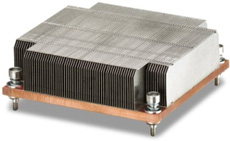Graphene Enhances Efficiency of Heat Spreaders by 25 Percent
A scientist discovered a way to cool semiconductors much more efficiently than a traditional copper-based heat-spreader can.
According to Jag Kasichainula, an associate professor of materials science and engineering at NC State, graphene could be key to improve simple cooling methods.
The scientists developed a heat-spreader that consists of a copper-graphene composite that was attached to an "electronic device" with an indium-graphene interface film. Tests showed that the increased conductivity by using graphene can dissipate heat about 25 percent faster than pure copper. Kasichainula also noted that graphene is less expensive than pure copper, which could reduce the cost of heat spreaders in the future.
In a paper published in the April 2012 issue of Metallurgical and Materials Transactions B claims the researcher describes test results in which a 200 micron thin film of copper-graphene deliver a thermal conductivity of 460 watts per meter per kelvin (W/mK), up from just 380 W/mK of electrolytic copper at a temperature of 27 degrees Celsius. The conductivity of copper-graphene increases with lower temperatures and decreases with substantially higher temperatures. Kasichainula said that the conductivity was 510 W/mK at -23 degrees Celsius and 440 W/mK at 77 degrees Celsius.
Get Tom's Hardware's best news and in-depth reviews, straight to your inbox.

Douglas Perry was a freelance writer for Tom's Hardware covering semiconductors, storage technology, quantum computing, and processor power delivery. He has authored several books and is currently an editor for The Oregonian/OregonLive.
-
Bloob Somehow it feels like technology will jump 10 years ahead when we finally master graphene production. It's almost as good as duct tape.Reply -
memadmax So, what does this mean boys n girls?Reply
You can get an extra 100mhz overclock on ur bulldozer!
=D -
Bloob memadmaxSo, what does this mean boys n girls?You can get an extra 100mhz overclock on ur bulldozer!=DIt means we might see passively cooled 78xx-series... ( or more likely 88xx or 98xx )Reply -
shin0bi272 "The conductivity of copper-graphene increases with lower temperatures and decreases with substantially higher temperatures. Kasichainula said that the conductivity was 510 W/mK at -23 degrees Celsius and 440 W/mK at 77 degrees Celsius."Reply
So the law of diminishing returns strikes again. What's the conductivity at 100C? Since some hardware gets above 77C...If its worse than copper this should be relegated to lower power devices. Since you know carbon isnt known for its heat conductivity. -
drwho1 While reading this, all I could think off was... Why don't just try to make the whole thing off this material? Would it work without the copper? If possible, how lower temperatures can/could get?Reply -
neon neophyte Reply9359346 said:"The conductivity of copper-graphene increases with lower temperatures and decreases with substantially higher temperatures. Kasichainula said that the conductivity was 510 W/mK at -23 degrees Celsius and 440 W/mK at 77 degrees Celsius."
So the law of diminishing returns strikes again. What's the conductivity at 100C? Since some hardware gets above 77C...If its worse than copper this should be relegated to lower power devices. Since you know carbon isnt known for its heat conductivity.
Diamond is one of the better known heat conductors actually. Diamonds being made of carbon. -
suddenstop shin0bi272"The conductivity of copper-graphene increases with lower temperatures and decreases with substantially higher temperatures. Kasichainula said that the conductivity was 510 W/mK at -23 degrees Celsius and 440 W/mK at 77 degrees Celsius."So the law of diminishing returns strikes again. What's the conductivity at 100C? Since some hardware gets above 77C...If its worse than copper this should be relegated to lower power devices. Since you know carbon isnt known for its heat conductivity.Reply
Well maybe they wouldn't get that hot anymore. Place a fan on it and as temp comes down the sink pulls more heat. The cooler it gets the cooler it gets. Also, hot areas of the sink would have slightly less thermal conductivity than cooler places - better distributing the heat load across the entire sink. My cpu at 4G stays under 60c and my gpu hangs out at 80c. In both cases this technology would be a massive improvement.
